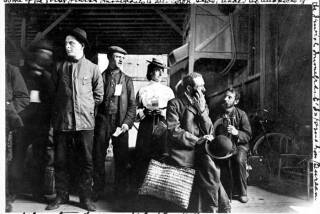Attends Seder Dinner With Them : ‘Never Give Up,’ Shultz Tells Soviet Refuseniks
- Share via
MOSCOW — Secretary of State George P. Shultz took time out from arms control negotiations Monday to attend a Seder dinner and tell leading Jewish refuseniks that they should “never give up, never give up.”
Shultz said the United States welcomed a recent increase in Jewish emigration and the release of political prisoners, but added that he wants, in a word, “more.”
In an emotional address to about 75 Soviet and American Jews, he promised to raise the issue whenever U.S. diplomats meet with Soviet officials.
“More political prisoners should be released,” he said. “We want to see more opportunity for emigration. There is a trickle, and it has begun to grow a little.”
In the audience were Josef Begun, who was recently released after almost two years in a Soviet labor camp following his conviction of anti-Soviet activity; Alexander Lerner, the 74-year-old dean of the Moscow refuseniks, and Vladimir Slepak, who for 17 years has been denied permission to leave the country.
Shultz’s appearance was a dramatic symbol of support for Jews who seek to go to Israel or some other country but have been denied permission to emigrate.
“You are in our minds,” Shultz said. “You are in our hearts. We think about you and pray for you. . . . You can be sure that we will continue to struggle on your behalf.”
One of the refuseniks, Lazar Yusefovich, 37, said he was in the 26th day of a hunger strike to support his plea for emigration. He gave Shultz a photograph of himself and his wife and four children, and said, “You are our last hope, Mr. Shultz.”
Emotional Meeting
Shultz, visibly moved, went from table to table and greeted every guest.
“We never stop, and if our hopes are disappointed, we keep on, and we hope that eventually we’ll succeed,” he told Yusefovich.
Assistant Secretary of Defense Richard N. Perle and Kenneth L. Adelman, head of the Arms Control and Disarmament Agency, also took part in the Seder, which marks the beginning of Passover and commemorates the biblical Jews’ exodus from slavery in Egypt.
Perle, a key draftsman of the Jackson-Vanik Amendment, which links the level of emigration to the Soviet Union’s most-favored-nation status regarding trade, had tears in his eyes when he was introduced to Lerner.
“Don’t change it--don’t give it up,” Lerner told Perle, referring to the Jackson-Vanik Amendment, which has come under attack by U.S. business executives who regard it as an obstacle to increased Soviet-American trade.
Later, talking with reporters, Lerner said that increased Jewish emigration is important to Soviet leader Mikhail S. Gorbachev.
“He’ll win a lot if he does and lose a lot if he doesn’t (permit more emigration),” Lerner said of Gorbachev. “That issue is the only substantial obstacle to better relations with the West.”
Begun took a more skeptical view, saying: “Until now, we can see Gorbachev doesn’t change the Jewish problem in a radical way. There is some kind of relaxation, maybe only to show the outside world that something is done here, not more.”
Jewish emigration, which peaked at nearly 51,000 in 1979, has fallen below 1,000 annually in recent years. But last month, 470 Jews left the Soviet Union, nearly half the number that emigrated during all of last year.
Shultz’s appearance was clearly welcomed by the refuseniks invited to the third annual Seder at the U.S. ambassador’s residence. Shultz brought with him a photograph of Slepak’s grandchildren, provided by Slepak’s two sons in the United States, and Slepak said later, “I am very moved by his attention . . . and he (Shultz) was very moved.”
The secretary of state brought along a supply of matzo, the unleavened bread that is a part of the Seder ritual, and kosher wine. Shultz, an Episcopalian, wore a white yarmulke, or Jewish prayer cap, at the dinner.
He left the Seder to return to an unscheduled night session with Soviet Foreign Minister Eduard A. Shevardnadze. One of the issues to be discussed was human rights.
More to Read
Sign up for Essential California
The most important California stories and recommendations in your inbox every morning.
You may occasionally receive promotional content from the Los Angeles Times.










